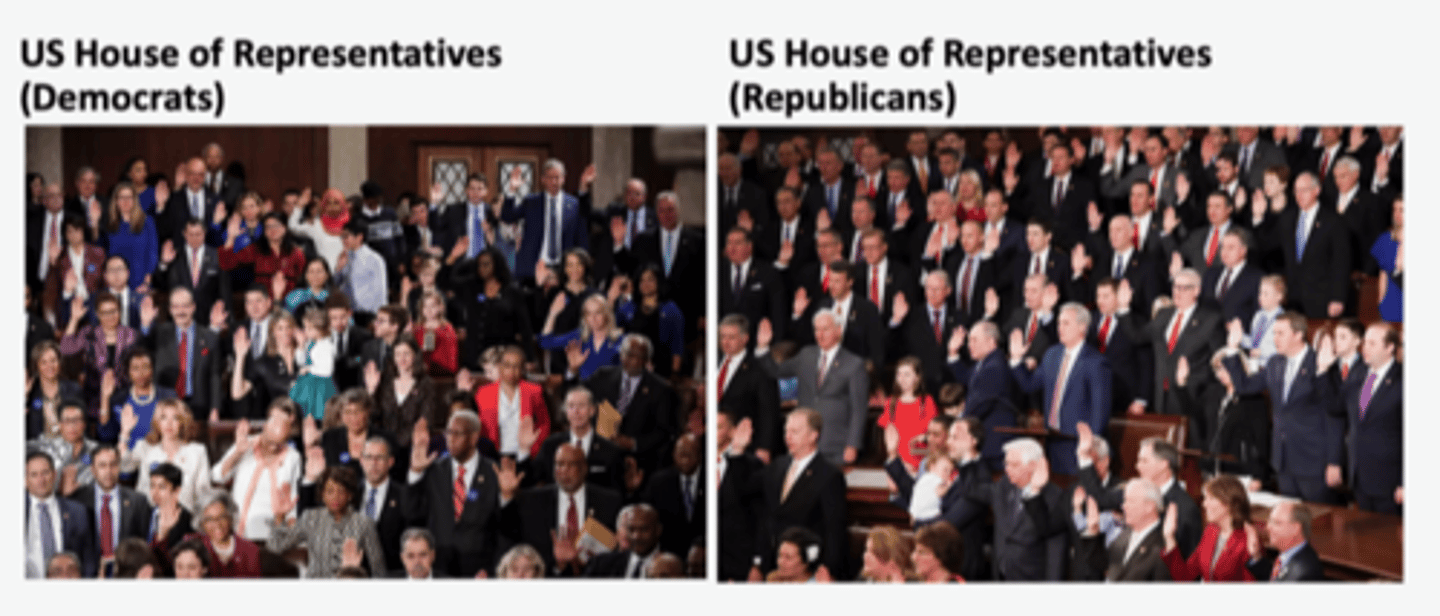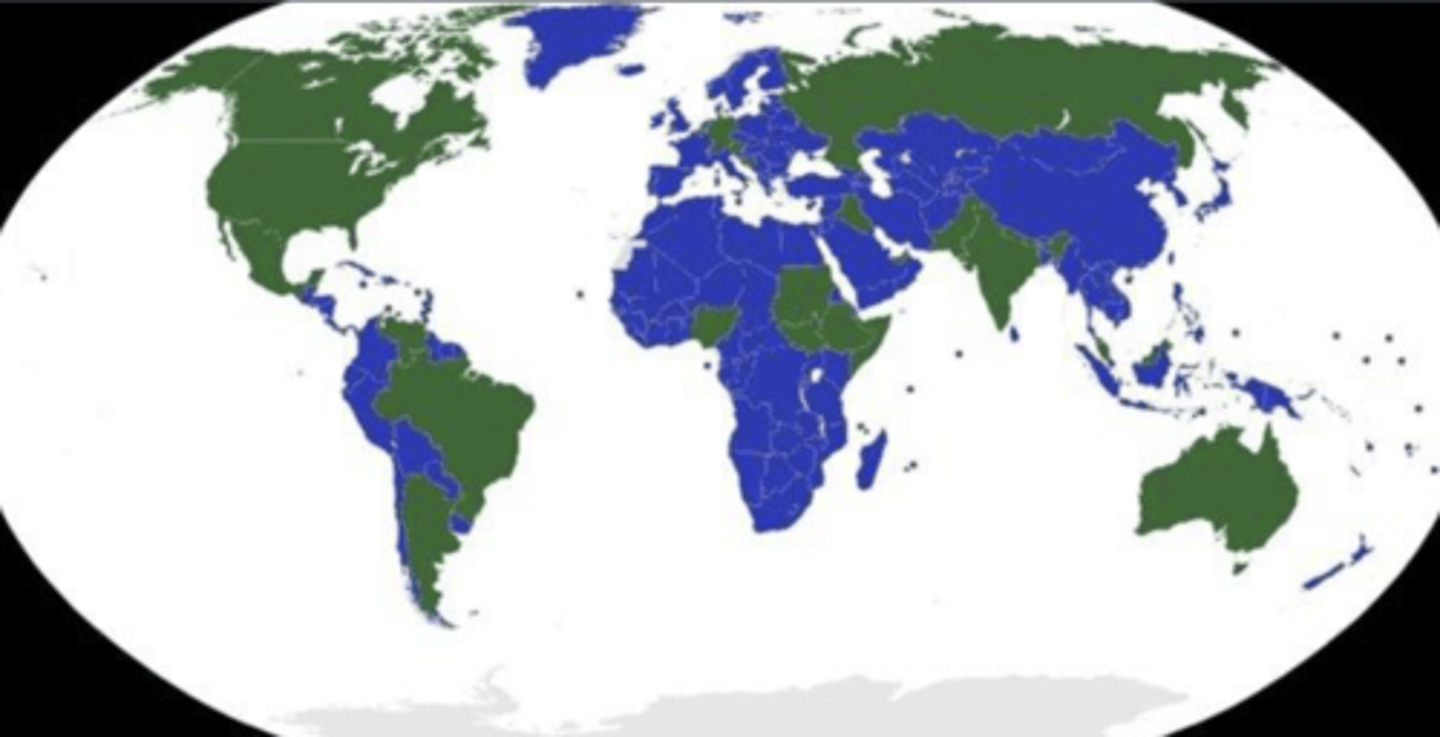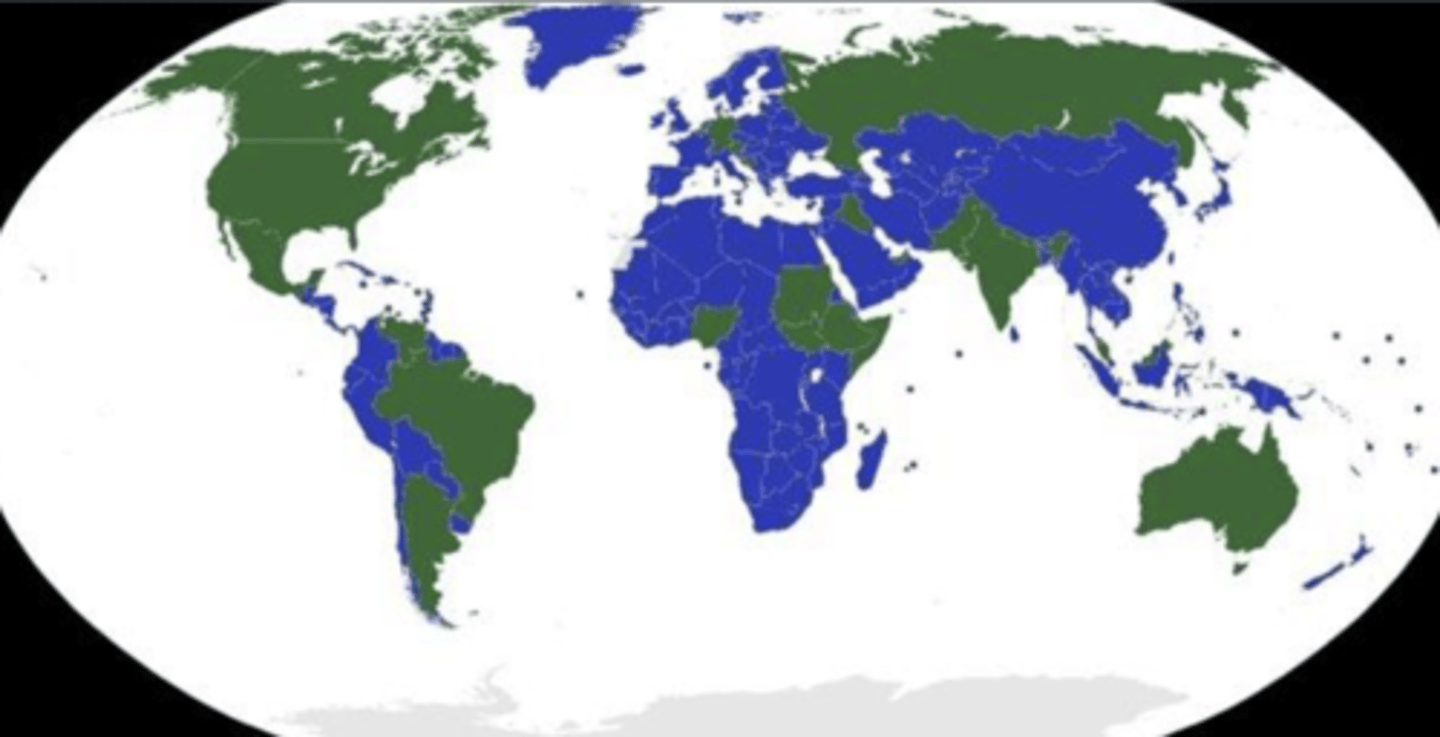Lecture 8: Parliaments (The Legislature), Federalism and Unitarism
1/34
There's no tags or description
Looks like no tags are added yet.
Name | Mastery | Learn | Test | Matching | Spaced | Call with Kai |
|---|
No analytics yet
Send a link to your students to track their progress
35 Terms
In NL we call them parliaments, what do they call the same function in other countries?
US = the legislature
FR = Assembly
so, the parliament = the legislature = the assembly
In the US House of Representatives, are the democrats or the republicans actually more representative?
the Democrats

What is a parliament?
where laws are made & government actions are overseen
(this looks a bit different in every country but it it is present in every democratic country!)
Is there a parliament in a presidential system?
YES.
What are the functions of parliament? (5)
keep in mind that there might be differences in functions for parliamentary and presidential systems
1) representation
2) creating legislation
3) controlling the government
4) vote of no confidence
5) forming government
- only in parliamentary systems tho!!
What does legislation mean?
function of parliament
= proposing, reviewing, amending and approving new laws
What are the types of representation? (4)
function of parliament
1) Descriptive representation = members of parliament represent the demographics of the public
- member of parliament should resemble the demographics of the public (gender, class, ethnicity etc.)
- aims to give a voice to underrepresented or marginalized groups in society
2) Substansive representation = members of parliament represent the needs and concerns of the public
- Parliamentarians are elected to represent the interests, needs, and concerns of the citizens, even if they don't share the same characteristics or backgrounds.
- representatives represent the ideas and needs of groups that don't look like them demographic wise.
3) Symbolic representation = members of parliament represent the values and beliefs of the public
- how are member of parliament perceived by voters, are the perceived as competent, as taking citizen concerns into account.
- Members of parliament embody and represent the values, beliefs, and aspirations of the citizens.
- They serve as symbols of the nation's collective identity and ideals.
4) Formalistic representation = members of parliament represent the public based on formal procedures and the rule of law
- the rules and arrangements that make representation possible: how they come to office, how they are accountable to citizens
- Parliamentarians fulfill their roles based on the formal procedures and functions of the parliament.
- e.g. are there fair elections? is there freedom of expression?
Can the president initiate legislation in a presidential system?
No, the president is not allowed to make and approve new laws himself. So he finds people to do it for him. Which is why the parliament has more power in a presidential system.
In what 5 ways does parliament control the government? they...
function of parliament
... question ministers
... approve government spending / budget
... debate about government actions
... could do a vote of no confidence
... review government activities in committees
What is the vote of no confidence?
function of parliament
= when the parliament votes that they have no confidence in the government --> then government resigns by culture even though it is not in the constitution!
Is there a vote of no confidence in a presidential system?
- no, they don't have that in this system!!!
- which is why the president doesn't need a majority
- president cannot go crazy --> he could get impeached for high crimes and misdemeanor (emergencies)
Which function do parliaments perform in parliamentary systems, but not in presidential systems?
forming a government
What is another word for Chamber of Parliament?
= House of Parliament
In what two ways can a parliament be structured?
unicameral system & bicameral system
How many countries are unicameral systems and how many are bicameral systems as of 2021?
113 countries unicameral
79 countries bicameral
How many chamber(s) does a unicameral system have?
one chamber (or house)
How many chamber(s) does a bicameral system have?
two chambers (or houses)
1) lower chamber
- more power or just as important
- usually elected directly and are closer to the people
2) upper chamber
- less power or just as important
- usually elected indirectly and further away from the people
What do you call the lower and upper chamber in NL, US and UK?
NL:
- lower chamber = Tweede Kamer
- upper chamber = Eerste Kamer
US:
- lower chamber = House of Representatives
- upper chamber = Senate
UK:
- lower chamber = House of Commons
- upper chamber = House of Lords
With the upper chambers, there are a lot of different ways as to how they got elected. What are 3 ways?
upper chamber in NL is the eerste kamer
1) direct elected by citizens
e.g. USA
- of all seats of all existing upper chambers --> 34% of all seats get elected this way
2) indirectly elected through regional or local parliaments
e.g. NL
--> we vote in provincial elections --> the people that get chosen vote people in the upper chamber (often they vote for the people of their own party)
- of all seats of all existing upper chambers --> 34% of all seats get elected this way
3) appointed through (regional) governments
e.g. Canada and Germany
- of all seats of all existing upper chambers --> 28% of all seats get elected this way
(4% through other methods)
What is weak bicameralism? and in what systems is this common?
= lower chamber dominates the upper chamber
- common in unitary countries with a parliamentary system
- because typically only the lower chamber can remove the government --> making the upper chamber is weaker
- e.g Netherlands and UK
What is strong bicameralism? and in what systems is this common?
= both chambers have roughly the same powers
- common in federal counties with presidential system --> e.g the US
- both have control mechanisms (e.g. impeachment)
- there are still some small differences but it is nothing compared to weak bicameralism!
Which countries/states usually have a bicameral system?
large, democratic, federal countries
What 2 kinds of countries are there?
a federal country & a unitary country
What is a federal country / federalism?
= sovereignty is shared between two or more levels of government, each has its own authority, independent powers and responsibilities
Two levels:
a) Federal level (central government)
b) State level (smaller regional governments)
in illustration: green states

What is a unitary state?
= There is only one central government that holds all the power.
- Local governments may exist, but they don't have as much autonomy as in federal states.
- The central government makes most of the important decisions.
in illustration: blue states

What are favorable conditions for a federal state to emerge? (3)
1) Democracies
2) Large areas / regions
3) Social, cultural, linguistic divisions
Democracies
Leaders in democracies may agree to share power between central and regional governments, as they're elected to represent diverse interests.
Large Size
In big areas, different regions might have unique needs, making it sensible to have local governments that understand and address those needs.
Social/Cultural/Linguistic Divisions
Regions with distinct cultures or languages may want more control over their affairs, leading to the creation of regional governments within a federal structure.
What are favorable conditions for a unitary state to emerge? (4)
1) Small areas / regions
2) No social, cultural and linguistic divisions
3) History of centralized rule
4) Former communist countries
Small Size
In small areas, it's easier to have one central government that can effectively govern the whole area.
e.g.; Southern America all small, except Argentina, Brazil and Mexico
Homogeneity
When people are similar in culture, language, and beliefs, they may prefer a single government to represent them all.
History of Centralized Rule
If history shows a strong central authority, it's more likely to continue in a unitary system.
Former Communist Countries
These countries may prefer a single, strong central government to avoid perceived dominance by one region or group.
The USA is a ... state, while the UK is a ... state?
USA = federal
UK = unitary
In a federal state like US
... federal laws are implemented by federal agencies
What are typical tasks on federal level in a federal state? (4)
1) Defense
2) Foreign Affairs
3) Immigration
4) Regulating trade between states
--> such as monetary policy
What are typical tasks on state levels in a federal state? (4)
1) Education
2) Housing
3) Local transport
4) Law enforcement
What are residual powers in a federal state?
= the powers that are not specifically assigned to the federal level/central government or state level/regional governments in the constitution. Instead, they belong to the central government by default unless stated otherwise.
What is cooperative federalism?
= intermingling of functions
= the federal level/central government and state level/regional governments work together to solve problems and make decisions, sharing responsibilities and resources to achieve common goals
e.g of Germany --> states implement federal policies and federal level supports state policies; the levels cooperate!
What is dual federalism?
= Independent functioning
= the powers and responsibilities of the federal level/central government and state level/regional governments are clearly separated, with each having its own distinct areas of authority and little overlap.
e.g., US
Decentralization in unitary states; what are the 3 ways for decentralization in a unitary state?
who makes policies?
who carries policies out?
level of autonomy / freedom?
1) De-concentration
- Central government makes policies
- Civil servants implement these policies but from different places, not just one main location
- Tasks are spread out among different offices across the country, but they're still carried out by civil servants
2) Delegation
- Central government gives some money or resources to local authorities
- Local authorities have to use these resources to complete specific tasks
- While local authorities have some freedom to decide how to do the tasks, they still have to follow guidelines set by the central government
3) Devolution
- Seen in countries like the UK
- Regions or local areas get more political power
- They might have their own parliaments or assemblies
- They can make some of their own laws or regulations
- However, the central government still holds the ultimate power and can take back some of the powers given to regions if needed